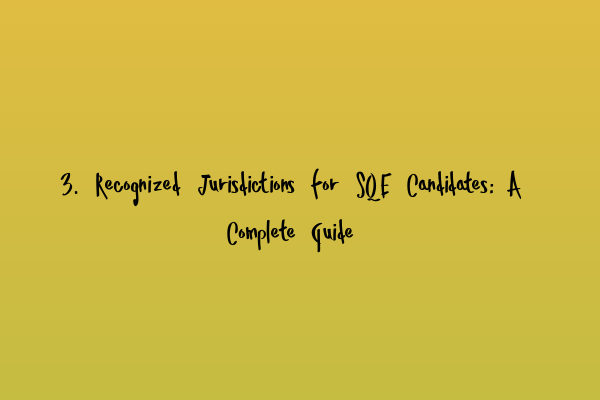3. Recognized Jurisdictions for SQE Candidates: A Complete Guide
If you’re considering taking the SQE exam – the Solicitors Qualifying Examination – you’ll know that it’s divided into two stages: SQE1 and SQE2. And while studying and preparing for these exams can be a daunting process, it’s important to understand the options available to you when it comes to choosing a recognized jurisdiction. In this complete guide, we’ll explore the various recognized jurisdictions for SQE candidates, providing you with valuable insights to make an informed decision.
1. England and Wales
Naturally, the most common jurisdiction chosen by candidates for the SQE exams is England and Wales. As the jurisdiction where the SQE exams are administered, studying and qualifying here comes with its own advantages. By selecting England and Wales as your jurisdiction, you’ll be gaining an in-depth understanding of the legal system in these jurisdictions, which will undoubtedly benefit your career as a solicitor in these regions.
2. Scotland
If you have an interest in practicing law in Scotland, choosing it as your recognized jurisdiction could be the ideal choice for you. While the SQE exams are not specifically designed for Scottish law, it is still a recognized jurisdiction. By selecting Scotland, you’ll gain knowledge and insights into the unique legal system of Scotland, enhancing your career prospects in this region.
3. Northern Ireland
Similar to Scotland, Northern Ireland is also a recognized jurisdiction for SQE candidates. If you’re keen on practicing law in Northern Ireland, choosing it as your jurisdiction can provide you with valuable knowledge about the legal system specific to this region. This can significantly enhance your career opportunities and give you a competitive advantage in the Northern Irish legal market.
4. Other Recognized Jurisdictions
In addition to England and Wales, Scotland, and Northern Ireland, there are several other recognized jurisdictions that SQE candidates can choose from. These include jurisdictions such as the Channel Islands, Isle of Man, and various overseas territories. By selecting one of these jurisdictions, you’ll expose yourself to different legal systems and broaden your legal expertise, which can be beneficial if you aspire to work globally or have clients from these regions.
It’s important to note that if you choose a recognized jurisdiction other than England and Wales, you may be required to complete additional qualifications or training to practice law there. Therefore, it’s essential to thoroughly research the requirements and regulations of your chosen jurisdiction before making a decision.
In conclusion, the SQE exams provide flexibility for candidates to choose their recognized jurisdiction, allowing them to specialize in a particular legal system or broaden their horizons by exploring different jurisdictions. Whether you decide to study and qualify in England and Wales, Scotland, Northern Ireland, or any other recognized jurisdiction, it’s crucial to understand the unique aspects of the legal systems and the potential career opportunities they offer.
For more information on preparing for the SQE exams and maximizing your chances of success, be sure to check out our related articles:
– Conquer the Multiple Choice Questions (MCQ) in SQE1
– Mastering Effective Revision Techniques for SQE Success
– Interactive mock tests for SQE: Enhancing engagement and learning
– SQE Sample Papers: Practice for Exam Success
– Focus Areas in SQE1 and SQE2: Mastering Key Concepts
These articles will provide you with valuable tips, strategies, and resources to help you excel in your SQE exam journey. Good luck!
